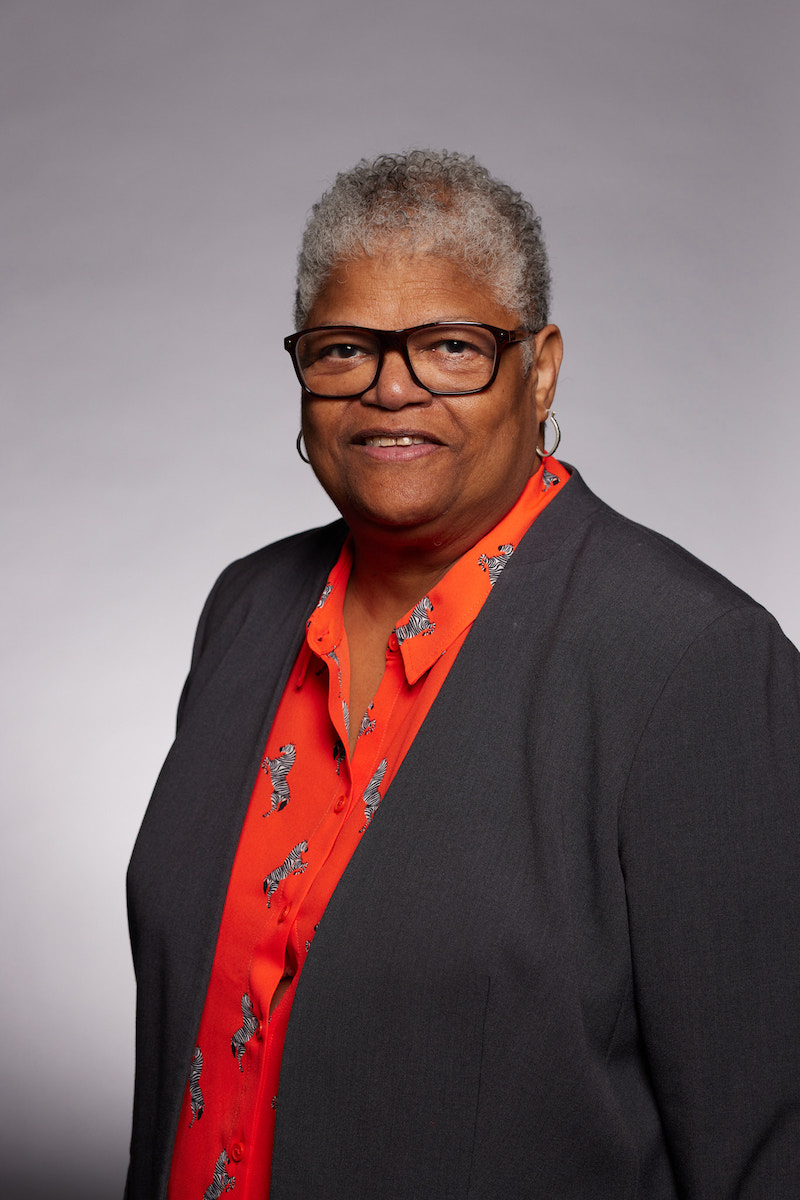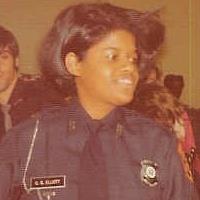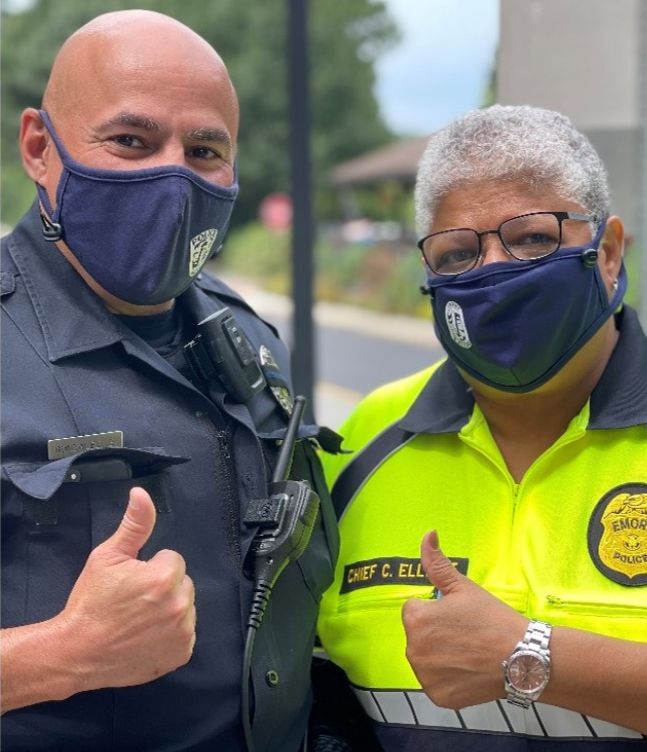After 36 years at Emory, Cheryl Elliott is retiring from her current role as vice president of public safety at the end of the semester. And this time, she says, it’s for good.

Over her 36 at Emory, Cheryl Elliott has served the university community and has led a variety of efforts to enhance campus safety. She will retire at the end of the fall 2024 semester.
Elliott retired once before in 2017, but she returned to Emory in 2021. During that hiatus, she looked around her home and wondered why there weren’t any pictures of her colleagues, especially when she’d had such a long and impactful career. The walls should have been adorned with the names and faces of those who helped her — and those she helped — along the way.
“When I retired the first time, I walked out the door and was like, ‘Okay, what do I do now?’” Elliott says. “I recognized when I got home that I didn’t have enough pictures of the people I cared about in the department.”
Elliott joined the Emory Police Department in 1988. She worked her way up from officer to deputy chief — the role she retired from in 2017 before returning in 2021 as police chief. In 2023, she transitioned to vice president of public safety, overseeing the police department, business continuity, Clery compliance, physical security systems and the Office of Critical Event Preparedness and Response (CEPAR).
“Throughout her distinguished career at Emory, Cheryl Elliott always stepped up to serve,” says Emory President Gregory L. Fenves. “As a police officer, she put everything into her work to keep this community safe. I am especially grateful that Chief Elliot agreed to come out of retirement to lead the Emory Police Department and then serve as vice president for campus safety. I wish her the best as she concludes her time at Emory.”
Elliott’s impact at Emory will not end with her retirement, notes Christoper Augostini, executive vice president for business and administration and enterprise chief financial officer.
“Cheryl Elliott's transformational leadership will benefit the Emory community for years to come,” Augostini says. “Her unwavering dedication, compassionate approach and tireless commitment to ensuring the safety and well-being of students, faculty, staff and community members at one of most complex periods in our history sets a standard of excellence that is recognized at Emory and beyond.”
Over the years, Elliott has been a part of many programs to enhance public safety on campus, including serving on the president’s commissions on the status of women and on the status of minorities. Her work has ventured beyond university walls, too. She was a founding member of the Dekalb County Domestic Violence Task Force.
“Most importantly, I’m a product of southwest Atlanta,” she says. “An Atlanta girl. And the number of police chiefs who are female is small, but the number of police chiefs who are Black and female is even smaller. That was huge for me, to go from an officer here to police chief.”
Taking care of others from the start
Elliott’s desire to pursue a career in public safety began in her childhood days at home and in the schoolyard.
“I was the oldest child, and I had a guardian mentality of taking care of my three sisters,” she says. “I saw myself as a peacemaker.” She developed her sense of justice early, in the neighborhood and on the playground. It was also informed by the world around her — segregation in Atlanta and her proximity to the civil rights movement.

Elliott started in higher education policing at Georgia State University in the mid '70s. In 1988, she began her storied career at Emory.
She attended Central United Methodist Church, which was then the pastoral home of civil rights leader Joseph Lowery, who received an honorary doctor of divinity degree from Emory in 2010, a year after receiving the Presidential Medal of Freedom from Barack Obama.
His words on Sundays rung true to Elliott’s own experience. She remembers “the Black and white doors you went through,” and how she and a friend were eager to try a pizza place near Emory just after it was desegregated.
“We were scared but excited,” she says. “We’re going to be able to sit down and have a pizza and a beer in Dekalb County without somebody trying to throw us out.”
Elliott began her career in higher education policing at Georgia State University in 1975, more than 10 years before coming to Emory.
As an Emory officer, she took a course on nonviolent action at the King Center. Those principles would inform Elliott’s work as police chief and vice president of public safety. At Emory, she says she has been committed to locating “pathways to violence” and “interrupting that path.”
“My personal belief is that at the point we have conflict, it’s too late,” she says. “What is it that we could have done on the front end?”
Emory has honored Elliott for her excellence in service many times. Her accolades include Emory Police Officer of The Year, 1995; the International Society for Crime Prevention Practitioners’ George Sunderland Lifetime Achievement Award, 2004; Emory University employee of the year, 2005; Emory University Community 100 for Diversity, 2009; and Emory Campus Life Support Person of the Year, 2014.
She also received the American Society for Industry Security (ASIS) International President’s Award in 2016 and contributed to the standards and guidelines textbooks for ASIS professional certifications in workplace violence, management, investigations and certification testing.
When Elliott returned to Emory in 2021, she started the Emory Community Service Officer program, which trains non-sworn civilians to respond to miscellaneous requests. It is now a pathway to becoming an Emory officer.
A legacy of mentorship — and burnt popcorn
One of the crown jewels of Elliott’s career — what she is most proud of — is the development of the Emory Police Cadets, a program she started in the mid '90s for students to get involved with public safety. It continued through the early 2010s before transitioning into what is now the Emory Police Ambassador Program.
The cadets would work large student gatherings and partner with Emory Police and Emergency Medical Services to address any concerns or crises. They’d also host presentations on public safety issues, like alcohol awareness during spring break and registering student bicycles.
Elliott says she’s enjoyed watching former cadets become “economists, health care administrators, lawyers, doctors. They all came out of that group, and over time we’ve stayed connected to each other.”
One former cadet, Saudi Paul, turned her experience into a full-time job with Emory Police. She was an Emory student and has been with the department since 2002. She progressed from cadet to communications officer in the dispatch center to her current position of records coordinator.

When Elliott returned to Emory after her first retirement, she made it a priority to get photos with colleagues.
“A good portion of my path, she’s held my hand or just stood behind so I could go off on my own,” Paul adds. “She’s very passionate about everyone around her growing, not just people working with her but the entire department. She wants everyone to be better than they were than when they started. And I think that says a lot about her as a person. I’ve always admired and respected that.”
Part of creating that workplace culture, Elliott says, is leading by example.
“The best thing in the world is to model the behavior you want and then make certain they understand what policing is going to be like at Emory,” she says. “It's about showing up for the community. It's about listening.”
Paul remembers Elliott as a no-nonsense kind of supervisor and a tireless worker — someone truly committed to campus safety.
For example, she says Elliott — back when she was a lieutenant — loved to make popcorn in the office kitchen. But as soon as she started cooking, she would get distracted by whatever task was at hand.
The whole office knew: If you could smell burnt popcorn, Elliott had left it for something more important.
“Vice President Elliott could not keep up with that microwave to save her life,” Paul says with a chuckle. “Any time popcorn was burning we knew. She’d moved on to the next task.”
Pictures for the wall
With retirement on the horizon, Elliott plans to relax and spend time with her three grandchildren — and if she feels the need to stay busy, to do some consulting on the side.
She also plans to travel. First on her itinerary is a visit the Grand Canyon in June — an opportunity, as she describes it, to show her grandkids a big “hole in the ground.”
This time, though, when she walks out the door on her last day at Emory, she’ll have what she needs to stay put.
“I did get those pictures,” she says.
